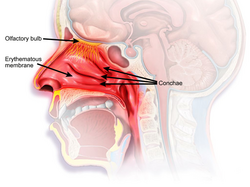Rhinitis medicamentosa

Editor-In-Chief: Prab R Tumpati, MD
Obesity, Sleep & Internal medicine
Founder, WikiMD Wellnesspedia &
W8MD's medical weight loss NYC, sleep center NYC
Philadelphia medical weight loss and Philadelphia sleep clinics
| Rhinitis medicamentosa | |
|---|---|

| |
| Synonyms | Rebound nasal congestion |
| Pronounce | N/A |
| Specialty | N/A |
| Symptoms | Nasal congestion, nasal discharge, sneezing |
| Complications | Chronic rhinitis, sinusitis |
| Onset | After prolonged use of nasal decongestants |
| Duration | Persistent until treatment is stopped |
| Types | N/A |
| Causes | Overuse of topical decongestants |
| Risks | Prolonged use of nasal sprays |
| Diagnosis | Clinical evaluation |
| Differential diagnosis | Allergic rhinitis, non-allergic rhinitis |
| Prevention | Limiting use of nasal decongestants to 3-5 days |
| Treatment | Discontinuation of decongestants, nasal corticosteroids, saline nasal sprays |
| Medication | Intranasal corticosteroids, antihistamines |
| Prognosis | N/A |
| Frequency | Common in individuals using nasal decongestants |
| Deaths | N/A |

Rhinitis medicamentosa is a condition characterized by nasal congestion that occurs as a result of the overuse of topical nasal decongestants. This condition is also known as "rebound congestion" and is a form of drug-induced rhinitis.
Pathophysiology[edit]
Rhinitis medicamentosa is primarily caused by the prolonged use of topical nasal decongestants, such as oxymetazoline, phenylephrine, and xylometazoline. These medications are sympathomimetic amines that act as vasoconstrictors, reducing blood flow to the nasal mucosa and thereby decreasing swelling and congestion. However, with continuous use beyond 3-5 days, the nasal mucosa becomes less responsive to the medication, leading to a cycle of dependency and worsening congestion when the medication is not used.
Symptoms[edit]
The primary symptom of rhinitis medicamentosa is persistent nasal congestion that does not improve with continued use of nasal decongestants. Patients may also experience: - Nasal obstruction - Difficulty breathing through the nose - Increased nasal discharge - Dryness or irritation of the nasal passages
Diagnosis[edit]
Diagnosis of rhinitis medicamentosa is typically based on the patient's history of nasal decongestant use and the presence of symptoms. A physical examination may reveal swollen nasal turbinates and erythematous mucosa. In some cases, nasal endoscopy may be performed to assess the extent of mucosal changes.
Treatment[edit]
The primary treatment for rhinitis medicamentosa is the cessation of the offending nasal decongestant. This can be challenging for patients due to the rebound congestion that occurs upon withdrawal. Management strategies include: - Gradual tapering of the decongestant - Switching to oral decongestants or antihistamines - Use of intranasal corticosteroids to reduce inflammation - Saline nasal sprays to maintain moisture and aid in mucosal recovery
Prevention[edit]
To prevent rhinitis medicamentosa, it is recommended to limit the use of topical nasal decongestants to no more than 3-5 consecutive days. Patients should be educated on the risks of overuse and encouraged to seek alternative treatments for chronic nasal congestion.
Also see[edit]
- Rhinitis - Nasal decongestant - Nasal spray - Rebound effect
Ad. Transform your life with W8MD's Budget GLP-1 injections from $75


W8MD offers a medical weight loss program to lose weight in Philadelphia. Our physician-supervised medical weight loss provides:
- Weight loss injections in NYC (generic and brand names):
- Zepbound / Mounjaro, Wegovy / Ozempic, Saxenda
- Most insurances accepted or discounted self-pay rates. We will obtain insurance prior authorizations if needed.
- Generic GLP1 weight loss injections from $75 for the starting dose.
- Also offer prescription weight loss medications including Phentermine, Qsymia, Diethylpropion, Contrave etc.
NYC weight loss doctor appointmentsNYC weight loss doctor appointments
Start your NYC weight loss journey today at our NYC medical weight loss and Philadelphia medical weight loss clinics.
- Call 718-946-5500 to lose weight in NYC or for medical weight loss in Philadelphia 215-676-2334.
- Tags:NYC medical weight loss, Philadelphia lose weight Zepbound NYC, Budget GLP1 weight loss injections, Wegovy Philadelphia, Wegovy NYC, Philadelphia medical weight loss, Brookly weight loss and Wegovy NYC
|
WikiMD's Wellness Encyclopedia |
| Let Food Be Thy Medicine Medicine Thy Food - Hippocrates |
Medical Disclaimer: WikiMD is not a substitute for professional medical advice. The information on WikiMD is provided as an information resource only, may be incorrect, outdated or misleading, and is not to be used or relied on for any diagnostic or treatment purposes. Please consult your health care provider before making any healthcare decisions or for guidance about a specific medical condition. WikiMD expressly disclaims responsibility, and shall have no liability, for any damages, loss, injury, or liability whatsoever suffered as a result of your reliance on the information contained in this site. By visiting this site you agree to the foregoing terms and conditions, which may from time to time be changed or supplemented by WikiMD. If you do not agree to the foregoing terms and conditions, you should not enter or use this site. See full disclaimer.
Credits:Most images are courtesy of Wikimedia commons, and templates, categories Wikipedia, licensed under CC BY SA or similar.
Translate this page: - East Asian
中文,
日本,
한국어,
South Asian
हिन्दी,
தமிழ்,
తెలుగు,
Urdu,
ಕನ್ನಡ,
Southeast Asian
Indonesian,
Vietnamese,
Thai,
မြန်မာဘာသာ,
বাংলা
European
español,
Deutsch,
français,
Greek,
português do Brasil,
polski,
română,
русский,
Nederlands,
norsk,
svenska,
suomi,
Italian
Middle Eastern & African
عربى,
Turkish,
Persian,
Hebrew,
Afrikaans,
isiZulu,
Kiswahili,
Other
Bulgarian,
Hungarian,
Czech,
Swedish,
മലയാളം,
मराठी,
ਪੰਜਾਬੀ,
ગુજરાતી,
Portuguese,
Ukrainian